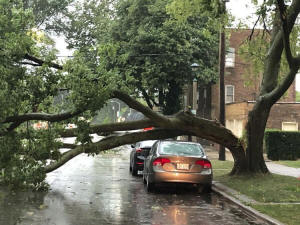State officials encourage Illinoisans to plan for weather emergencies
 Send a link to a friend
Send a link to a friend
 [March 22, 2021]
By Zeta Cross [March 22, 2021]
By Zeta Cross
(The Center Square) Ė If a tornado hits in
the middle of the night, do you have two different devices to wake you
up so that you can take shelter?
March is Severe Weather Preparedness Month, and the goal is to get
people thinking about how to be ready if a severe weather emergency
hits.
Rebecca Clark of the Illinois Emergency Management Agency said the first
smart step is having two devices that provide wake-up alerts for severe
weather, but relying on only one type of alert may prove to be
dangerous.
ďDonít rely on a cell phone alone,Ē Clark said.
A free FEMA app is available for cell phones and it can be programmed to
wake people up, but a cell phone may be in another room or cell service
may be down, Clark said.
Clark said it is not safe to rely on only an outdoor siren alert, as
well.

"Donít rely on outdoor sirens," she said.
Outdoor sirens are not designed to rouse people who are sleeping.
Clark recommends having a weather radio with a battery backup that is
programmed to send out a loud warning. A weather radio can be programmed
for your zip code to give you vital emergency information, she said.
Weather radios let people know when the storm or tornado has passed and
it is safe to come out, Clark said.
[to top of second column]
|

Part of a tree that had split at the trunk lies on a road in Oak
Park, Ill., while also appearing not to have landed on a car parked
on the road, after a severe storm moved through the Chicago area
Monday, Aug. 10, 2020.
AP Photo/Dave Zelio

Clark emphasized the importance of having a designated safe place in
a house to go in case of severe weather. A ground floor bathroom
with no windows or a basement--if available--are good places to wait
out storms.
To be prepared for severe weather, everyone needs a plan and an
emergency supply kit. Batteries, non-plug-in cell phone chargers,
water, first aid kits, sleeping bags, non-electric can openers and
foods which require no cooking are some important items to have on
hand in case of emergencies, Clark recommended.
People may be separated during a severe weather emergency so itís
important to designate someone outside the home county that everyone
can call for check-ins, she said.
The National Weather Service and the Illinois Emergency Management
Agency offer a free Severe Weather Preparedness Guide with tips,
Clark said. The latest version of the guide has new information on
tornadoes and flash floods. Clark also invites people to take a look
at the website Ready Illinois for more lists of emergency supplies
and other key information. |